- Home
- Robert E. Howard
The Conan Compendium Page 12
The Conan Compendium Read online
Page 12
Now Granth son of Biemur picked his way along a game trail hardly wider than the spread of his shoulders. He clutched his pike with both hands, ready to impale anything that burst out from among the trees. Behind him tramped his cousin
Vulth, who hung on to his pike just as tight. And behind them strode Benno the Bossonian, an arrow nocked in his bow. As far as Granth knew, no other Aquilonians were within a mile or two of his comrades and him.
"Hondren!" he called. "Hondren! You out there? You hear me?" In lower tones, he muttered, "If we do find the stinking dog, we ought to beat his brains in for making us go through this nonsense."
"What makes you think he's got any brains to beat in?" asked Vulth. He too raised his voice: "Hondren! Where are you, you mangy hound?"
Benno spat. "Who cares if we find him or not? I can't stand that bad-tempered bastard, and I don't know anybody who can."
Granth wished the archer had not said that. He did not like Hondren, either, and also knew not a single man who did. Hondren was nothing but trouble for everyone around him. That had been true in the Aquilonian encampment next to Duthil. From things Granth had heard and others he had seen, it had been true in Duthil itself. And it was certainly true now that Hondren had gone missing in the woods.
"We're not looking for him for his sake ―Mitra knows that's true," said Vulth.
"'We're trying to find out what the devil happened to him. If the Cimmerians knocked him over the head, they've got to pay for it or they'll think we're soft."
That only made Benno spit again. "If it were up to me, I would have paid them to get rid of him."
"He was a good man in a fight," said Granth: as much praise as Hondren was ever likely to get now. He had been missing for three days. None of the search parties had found any trace of him.
"He did like fights," agreed Vulth, but that was not the compliment it might have been, for he went on, "He liked them so well, he'd start them himself."
"If he started one out here, he didn't win it," said Benno. "Something's gnawing
the meat off his bones right now." Somber satisfaction filled his voice.
"Something or somebody," said Vulth. "I wouldn't put it past these barbarians to eat man's-flesh."
"Anybody who ate Hondren would sick him up afterwards." Benno made horribly real-sounding retching noises.
After another hour's trudge through the dark, gloomy forest, Granth stopped caring what had happened to Hondren. All he cared about was making sure the same thing, whatever it had been, did not happen to him. He said, "We'll never prove the Cimmerians did him in."
"Maybe we'll kill ten of them anyway, just for the sport of it," said Benno. "We ought to start with the cursed smith in that village. You know the fellow I mean?
Big, ugly bruiser, and his eyes measure you for a coffin every time you walk past his doorway. I wouldn't be surprised if he was the one who knocked Hondren over the head."
"He doesn't hunt much himself," said Granth. "He usually sticks close to the forge and sends his son out instead."
"Maybe the boy did for Hondren," suggested Vulth. "That lad will be bigger than the blacksmith when he's done."
"He's not small now," said Granth.
"His beard hasn't even begun to sprout," said Benno with a scornful laugh. "If he put paid to Hondren, to hell with me if Hondren didn't deserve to die." That was cruel, but not too far from what Granth was also thinking.
A goldfinch fluttered across the game trail, a bright splash of color against the endless dark greens of the Cimmerian forest: warm brown back, black and white head, crimson face, and broad yellow chevrons on black wings. Three or four others danced through the air behind it, calling sweetly. Then they were gone, and shadows and silence ruled once more.
No, not quite silence, for a stream murmured and splashed just on the edge of hearing. Granth cocked his head to one side, to gauge the direction. "Shall we go over there?" he asked, pointing. "My water bottle is about empty."
"Well, have a swig from mine." Vulth took it off his belt and held it out to Granth. "I don't want to waste any time with side trips, and Hondren won't be in that stream unless he went and drowned himself."
"He wouldn't do anything like that," said Benno. "Too many people would thank him if he did."
Granth raised his cousin's water bottle to his lips, tilted back his head, and drank.
Sweet, strong Poitanian wine ran down his throat. He took a long pull, then gave the bottle back to Vulth, saying, "I made a good trade, for my bottle held nothing but water."
"Wine is sovereign against a flux of the bowels," said Vulth solemnly.
"No doubt," said Benno. "It also goes down smoother than water."
Laughing, the three Aquilonians went on down the track. Not a bowshot away, the stream chuckled to itself. Whatever secrets it held, secret they would stay.
Conan knew the invaders were beating the woods for their missing fellow. He saw search parties going into the forest ever)' morning. He slipped in amongst the tall trees himself more than once, shadowing the Gundermen and Bossonians as he had shadowed Hondren. Here, though, he remained but a shadow. Had he revealed himself to the blundering Aquilonians, they might have wondered if he had done the same to their missing soldier.
He wanted to brag about what he had done. He wanted to clamber up on his rooftop and shout out the news to all of Duthil ―no, to all of Cimmeria. Making himself keep silent might have been harder than slaying Hondren. But the thought of what the invaders would do to his village ―and, even more, the thought of what his father would do to him ― held his lips sealed.
Mordec noticed how much trouble he had keeping quiet. After a few days, Conan's father asked, "How would you like to go and spend some time with Nectan, boy? If you're helping him watch his sheep, you'll be keeping your secret from only one man, not from the whole village. Maybe that will be easier for you."
"All right, Father. I'll go," said Conan, who was always eager to give the shepherd a hand. Then he hesitated. "Will Mother be all right with just you here to take care of her?"
"I was taking care of your mother before you were born, you know," said Mordec.
"I'll go on doing it as long as we both live. Don't you worry about that. I know she snaps at me. Don't you worry about that, either. It's her way; she's short-tempered because of her sickness. But we understand each other well enough."
Reassured, Conan threw a loaf of brown bread and some smoked mutton into a leather sack and hurried out to the meadows to join Nectan. The shepherd seemed not at all surprised to see him. Only later did he wonder if his father had come this way before speaking to him.
"Good to have an extra pair of hands and an extra set of eyes with me," said Nectan. "It's lambing time now, and I don't deny I can use you here."
He did not set Conan to helping him help the ewes who had trouble giving birth.
Conan had no idea how much good Nectan's ministrations did the ewes. As always, the blacksmith's son marveled at how quickly the newborn lambs could start gamboling across the grass after their mothers ―and how quickly they could go gamboling off straight into trouble.
He pulled them out of a creek that ran through the hilly meadow. He watched some of them tumble down the hillsides and then get up again, apparently unharmed. And he watched one tumble down a hillside and then not get up, for it had broken a hind leg. Nectan stooped beside that one and cut its throat, and he and Conan ate roast lamb that night.
"Happens every year," said the shepherd as he cooked a chunk of meat over the
campfire. "Seems a shame, but it can't be helped. Hand me a few of those mint leaves, will you?" Eaten along with the lamb, they made the savory meat taste even sweeter.
Lambing season also brought wolves and eagles down on the flock, for they found newborn lamb every bit as savory as did Nectan and Conan. The shepherd and the blacksmith's son drove them off with showers of stones. Conan knocked down one great hawk on the wing. He thought he had killed it, but it fough
t its way into the air once more and flew off, screeching in pain and fear.
"Bravely done," said Nectan. "The way you throw, I'd not want to get in the way of a stone from your hand."
"I wanted it dead." Defeating a foe did not satisfy Conan; he craved nothing less than his enemies' utter destruction.
Nectan only shrugged. "I wouldn't want to kill off all the eagles. They're rare bold birds. Wolves, now―if your stones could smash in the skull of even' cursed wolf ever born, I'd not shed a tear. Only reason the wolves go after lambs instead of me is that I put up a tougher fight ―and I daresay the lambs are tastier, too." He chuckled.
Despite all they could do, the shepherd and his helper lost some lambs. Without Conan's help, the shepherd would surely have lost many more. Conan did shoot one wolf through the heart as it was about to leap on a lamb. Nectan skinned the beast and presented him with the hide.
"You keep it. I have others," said Conan, remembering his fight for life with the pack of wolves in the snow.
But Nectan would not hear of it. "A wolfskin for me?" He laughed at the very idea. "By Crom, the sheep would love me for that, wouldn't they, if I draped it round my shoulders for a rain cape? They'd flee me fast as they could run. If anyone is to get any use from it, that had best be you."
Seeing the shepherd's stubbornness, Conan could only nod. "I thank you," he said.
"If you have a need, come to the smithy. My father or I will do your work for you."
"I don't use much in the way of ironmongery, though I thank you for your kindness," said Nectan. "Arrowheads now and again, for I will lose shafts, same as any other archer. If I'm out here and can't come into Duthil, I'll chip the heads out of flint. I'm not so good as the cursed Picts, who do it all the time, but I manage."
"Picts," muttered Conan, and he scowled ferociously. In Cimmeria, the Aquilonians were enemies because they were neighbors and, at the moment, because they were invaders. Enmity between Picts and Cimmerians, though, was in the blood of both folk, and went back to the days when lost Atlantis still rose above the waves. As long as Cimmerians and Picts both survived, that enmity would also endure.
"I didn't say I loved 'em, boy, for I don't," responded Nee-tan. "But they do know how to chip stone. And they had better, for in working metal they may as well be so many helpless babes."
When Conan thought of Picts, he thought of killing Picts. No Cimmerian could think of Picts any other way. And when he thought of killing Picts, he thought less of the Gunderman he had actually slain. Little by little, as time went by, he grew less likely to brag about what he had done. The unending vigilance a herdsman needed also played its part in that: he was too busy to dwell excessively on what he had done.
His father let him stay with Nectan almost a month. By the time Mordec came out to reclaim him, he had for all practical purposes become a shepherd himself. "Do I have to go back to Duthil?" he asked. The prospect of dealing with people rather than sheep seemed distinctly unattractive.
"I was beginning to hope you would let me keep him, Mordec," added Nectan.
"He's as good here as anyone could hope to be."
"Glad to hear it," said Mordec. "But I have need of him, too, and so does the smithy." He nodded to Conan. "Come along, son."
His tone and his looming physical presence brooked no argument. However regretfully, Conan turned away from Nectan. "Aye, Father." He did not look back toward the shepherd until he and Mordec were at the edge of the meadow and about to plunge into the dominant Cimmerian forest.
Then he waved once. Nectan waved back just as Conan and Mordec plunged in amongst the trees.
They walked on for a while, their footfalls almost silent on the pine needles carpeting the forest floor. A red fox ran across the game trail they were using. The fox stared in astonishment; the breeze blew from it toward them, so it had not taken their scent, and not even its keen ears let it know they were near. With a flirt of its brush, it vanished behind a fir. Conan had started to nock an arrow.
Without a target, he slid the shaft back into its quiver.
High overhead, a hawk screeched shrilly. Again, Conan reached for an arrow.
Again, he left the motion incomplete. Nodding, Mordec said, "If it's after a lamb, it's Nectan's worry now."
"Soon the lambs will be too big for any bird to carry off," said Conan. "But the wolves are a different story. They will steal from the flock at any season of the year." He carried on his back the roughly tanned hide of the wolf he had killed.
"Miserable, thieving creatures."
"They might as well be men," remarked his father. After another minute or so, Mordec asked, "You liked it there, then?"
"I did, Father," said Conan, with an enthusiastic nod of his own. "Things are―simpler than they are in Duthil."
"No doubt." Mordec walked on once more before continuing. "Things in the village are less simple than when you left, too."
"Oh?" Conan did not care for the way his father said that. "What's gone on? And how is Mother?"
"Your mother is about the same as she always is," answered Mordec. "She is not well ―I do not think she will ever be well ―but she is no worse, or not much worse, than she was when you saw her last."
"All right," said Conan. His mother had been sickly for as long as he could remember. He always hoped she would get well, but he would have been amazed ―so amazed, he might not have known what to do ―if she actually had. He asked, "What about the village, then?"
"Ah. The village." Mordec did not seem eager to talk about it. At last, unwillingly, he said, "Well, Count Stercus has come back again."
"He has?" cried Conan. He grabbed for an arrow once more, though the gesture was even more useless than it had been with the fox or the hawk. "What is he doing there? Why won't he leave us alone?"
"Well, he said he came because of the Aquilonian soldier who disappeared near Duthil," answered Mordec. "The first time he said that, I feared he was going to punish us even if his men never found the fellow's body. But I think that just gave him the excuse he needed to come back anyhow."
"The excuse?" echoed Conan, his voice rising in puzzlement. But then a sudden, horrid certainty blazed in him, fueling fun' fierce as his father's forge. "Tarla!" he burst out.
"It seems so, yes," said Mordec unhappily. "He sniffs around her, sniffs around Balarg's house like a hungry hound after meat."
"I'll kill him!" raged Conan. "I'll cut his heart out and feed it to swine. I'll drape his guts over the roofpole. I'll ―His father shook him, hard. Conan's teeth clicked together on his tongue. Pain lanced through him. He tasted blood in his mouth. When he spat, he spat red. He said no more. Seeing that he was going to say no more, Mordec nodded in somber approval. "Good," said the blacksmith. "Maybe I've shaken some sense into you.
Can you imagine what would happen to Duthil if you were mad enough to murder the Aquilonian commander? Can you?"
"He deserves death," said Conan sullenly.
"Yes, no doubt," said Mordec. "I told you once you might kill him if he aims to debauch Balarg's daughter the way he did that other Cimmerian girl. But think on it. Wouldn't you say it's truly Balarg's first duty to defend her honor?'"
"I― " Conan broke off in confusion.
Laughing, Mordec finished for him: "You like the shape of Tarla's nose and her pretty little ankles, and so you think you can do what her father really should."
Conan walked on for a long time without saying another word. His cheeks and ears felt as if they were on fire. Like most boys first setting eyes on a girl they fancied, he had been too shy, too much afraid of making a fool of himself, to say much to the one who was the object of his affection. Like most boys, also, he had fondly believed his grand passion went unobserved by those around him. Finding himself so badly mistaken could be nothing less than mortifying.
"Don't fret, lad," said Mordec, not unkindly. "Maybe there will be a match between the two of you, and maybe there won't. It could happen. Seeing where Balarg and I stand in th
e village, joining our two houses might prove wise. We've even spoken of it, once or twice. But I will tell you this: whether the match comes or not, the world will go on. Do you understand me?" Still not trusting himself to speak, Conan grudged a nod. His father went on, "And I will tell you one thing more, no matter how little you care to hear it ― no one dies of a broken heart, even if people often wish they could. Do you understand that?"
Since Conan was convinced his father was raving like a lunatic, he could not very well nod again. Yet to shake his head would have been to deny the plain import of his father's words. With both choices bad, he walked on, pretending he had not heard. Mordec's rumbling chuckle said the pretense was imperfectly convincing.
Conan flushed once more.
They walked into Duthil side by side, Conan matching his father's long, tireless strides. Villagers and two or three soldiers from the camp not far away were on the main street. Conan, who had had no company save Nectan and a flock for the past month, stared in wonder at so many people all together.
A ball came rolling his way. Before he could do anything about it, his father leaped forward, kicked it with all his might, and sent it flying far down the street.
The usual shouting pack of boys chased after it. "I liked that," said Mordec, more cheerfully than Conan was used to hearing him speak. "When you grow up, you don't get the chance for such things so often, and that's a cursed shame." He pointed to the boys. "Do you want to get into the game? Do it while you can."
But Conan shook his head. After a month tending sheep, kicking a ball seemed a childish pursuit. He had been playing games all his life. If his father enjoyed them so much, he was welcome to them.

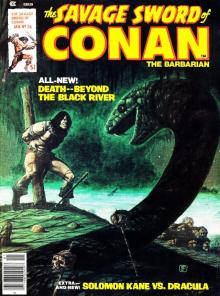 Beyond the Black River
Beyond the Black River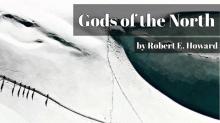 Gods of the North
Gods of the North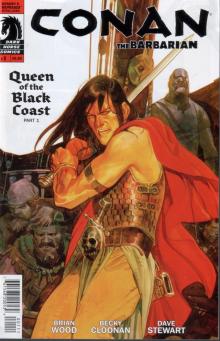 Queen of the Black Coast
Queen of the Black Coast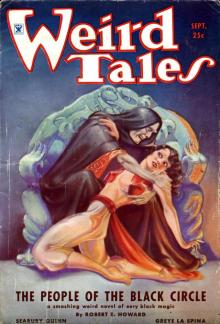 The People of the Black Circle
The People of the Black Circle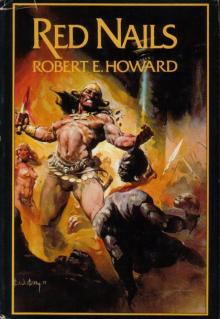 Red Nails
Red Nails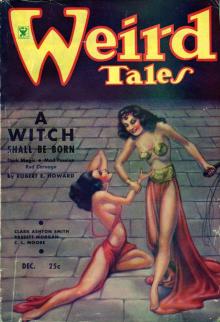 A Witch Shall Be Born
A Witch Shall Be Born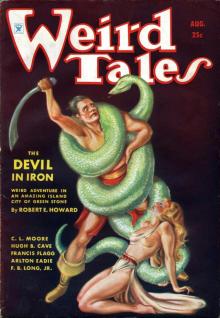 The Devil in Iron
The Devil in Iron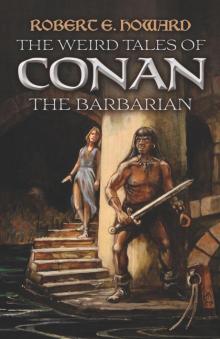 The Weird Tales of Conan the Barbarian
The Weird Tales of Conan the Barbarian The Bloody Crown of Conan
The Bloody Crown of Conan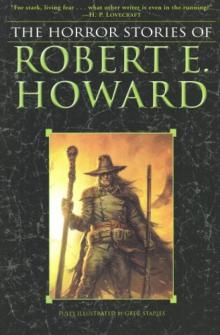 The Horror Stories of Robert E. Howard
The Horror Stories of Robert E. Howard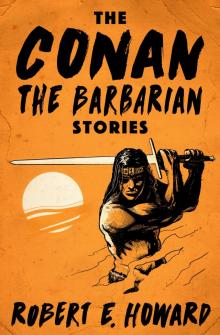 Conan the Conqueror
Conan the Conqueror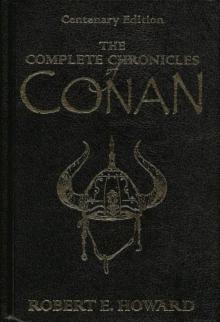 Conan the Barbarian
Conan the Barbarian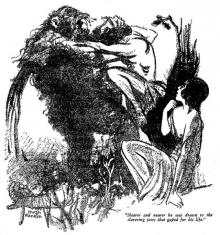 Shadows in the Moonlight
Shadows in the Moonlight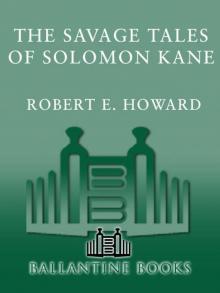 The Savage Tales of Solomon Kane
The Savage Tales of Solomon Kane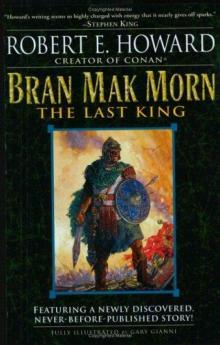 Bran Mak Morn: The Last King
Bran Mak Morn: The Last King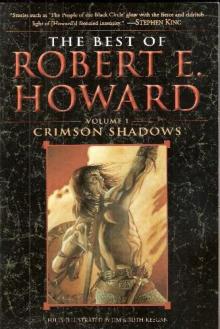 The Best of Robert E. Howard Volume One: Crimson Shadows
The Best of Robert E. Howard Volume One: Crimson Shadows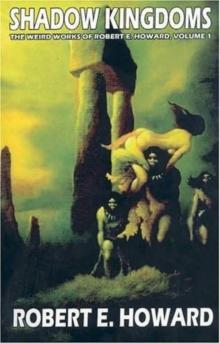 The Best of Robert E. Howard: Crimson Shadows (Volume 1)
The Best of Robert E. Howard: Crimson Shadows (Volume 1)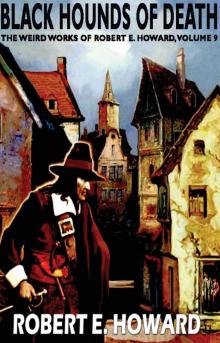 Black Hounds of Death
Black Hounds of Death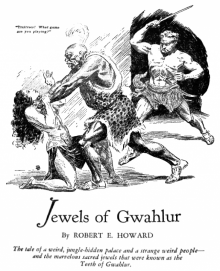 Jewels of Gwahlur
Jewels of Gwahlur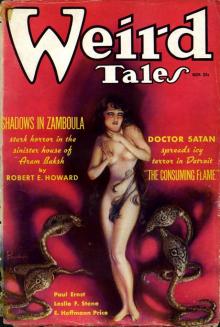 Shadows in Zamboula
Shadows in Zamboula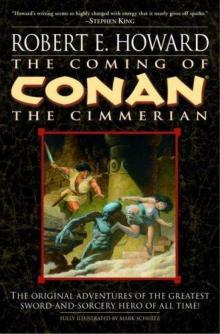 The Coming of Conan the Cimmerian
The Coming of Conan the Cimmerian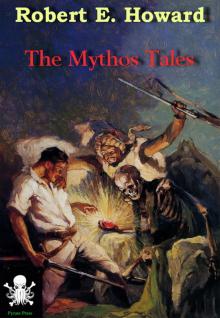 The Mythos Tales
The Mythos Tales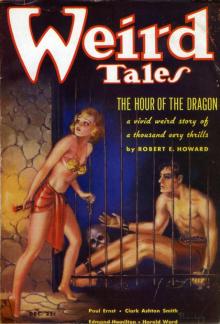 The Hour of the Dragon
The Hour of the Dragon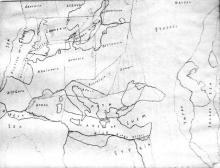 The Hyborian Age
The Hyborian Age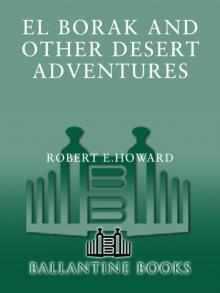 El Borak and Other Desert Adventures
El Borak and Other Desert Adventures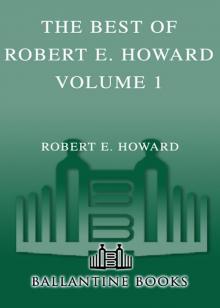 The Best of Robert E. Howard Volume 1 The Best of Robert E. Howard Volume 1
The Best of Robert E. Howard Volume 1 The Best of Robert E. Howard Volume 1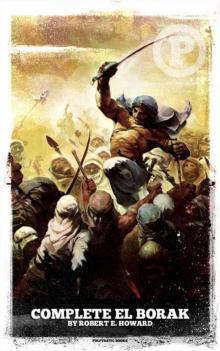 El Borak: The Complete Tales
El Borak: The Complete Tales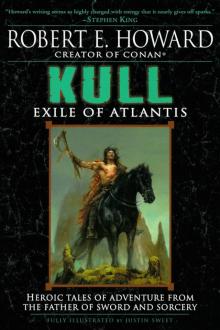 Kull: Exile of Atlantis
Kull: Exile of Atlantis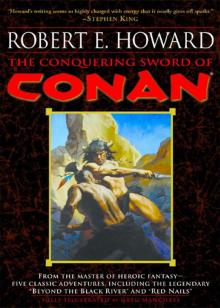 The Conquering Sword of Conan
The Conquering Sword of Conan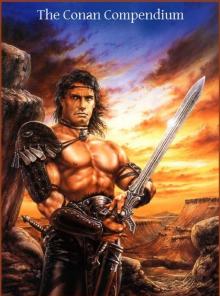 The Conan Compendium
The Conan Compendium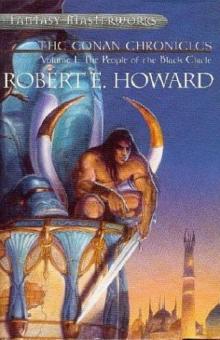 The Conan Chronicles: Volume 1: The People of the Black Circle
The Conan Chronicles: Volume 1: The People of the Black Circle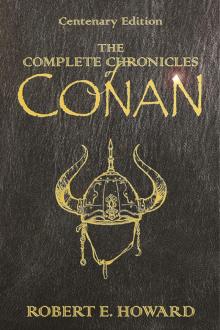 The Complete Chronicles of Conan: Centenary Edition
The Complete Chronicles of Conan: Centenary Edition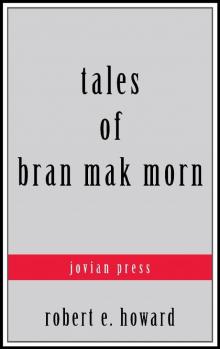 Tales of Bran Mak Morn (Serapis Classics)
Tales of Bran Mak Morn (Serapis Classics)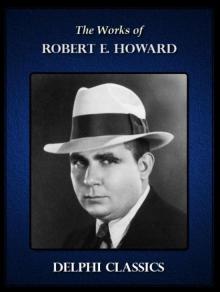 Delphi Works of Robert E. Howard (Illustrated) (Series Four)
Delphi Works of Robert E. Howard (Illustrated) (Series Four)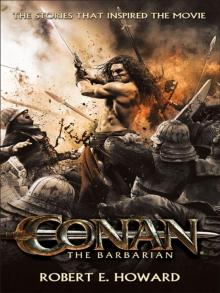 Conan the Barbarian: The Stories That Inspired the Movie
Conan the Barbarian: The Stories That Inspired the Movie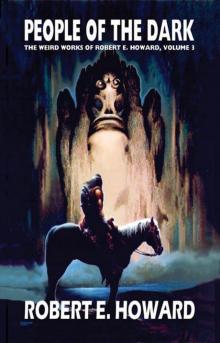 People of the Dark Robert Ervin Howard
People of the Dark Robert Ervin Howard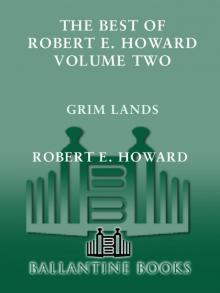 Grim Lands
Grim Lands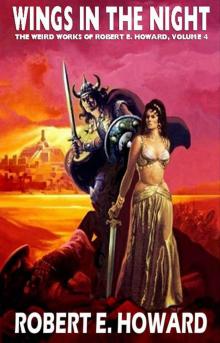 Wings in the Night
Wings in the Night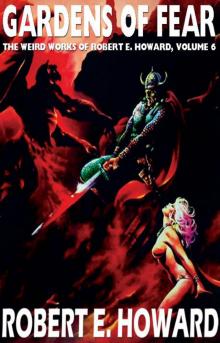 Gardens of Fear
Gardens of Fear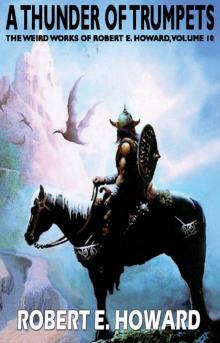 A Thunder of Trumpets
A Thunder of Trumpets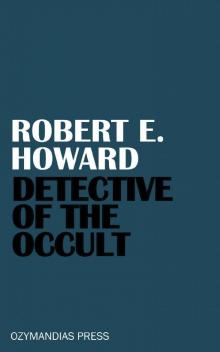 Detective of the Occult
Detective of the Occult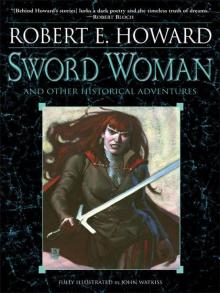 Sword Woman and Other Historical Adventures
Sword Woman and Other Historical Adventures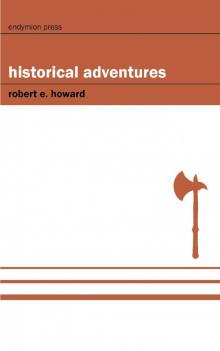 Historical Adventures
Historical Adventures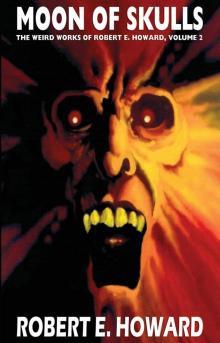 Moon of Skulls
Moon of Skulls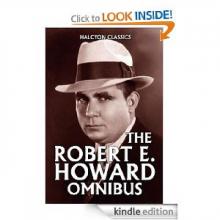 The Robert E. Howard Omnibus: 97 Collected Stories
The Robert E. Howard Omnibus: 97 Collected Stories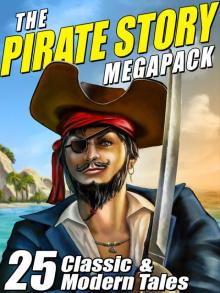 The Pirate Story Megapack: 25 Classic and Modern Tales
The Pirate Story Megapack: 25 Classic and Modern Tales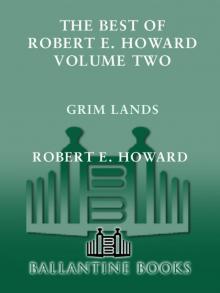 The Best of Robert E. Howard, Volume 2
The Best of Robert E. Howard, Volume 2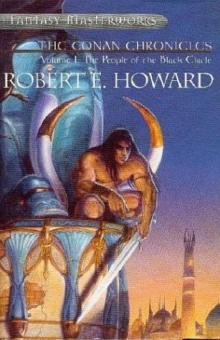 The Conan Chronicles, Vol. 1: The People of the Black Circle
The Conan Chronicles, Vol. 1: The People of the Black Circle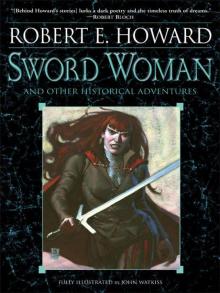 Sword Woman and Other Historical Adventures M
Sword Woman and Other Historical Adventures M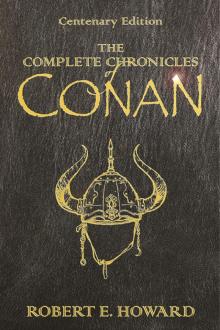 The Complete Chronicles of Conan
The Complete Chronicles of Conan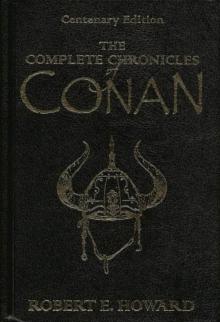 Conan the Barbarian: The Chronicles of Conan (collected short stories)
Conan the Barbarian: The Chronicles of Conan (collected short stories)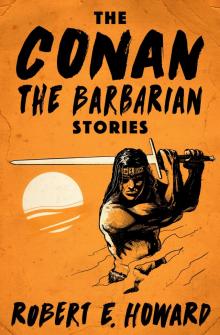 The Conan the Barbarian Stories
The Conan the Barbarian Stories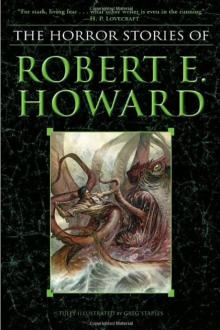 The Best Horror Stories of
The Best Horror Stories of Tigers Of The Sea cma-4
Tigers Of The Sea cma-4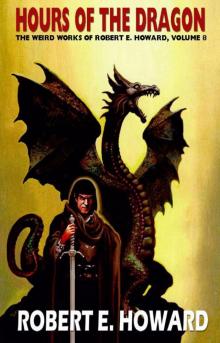 The Hours of the Dragon
The Hours of the Dragon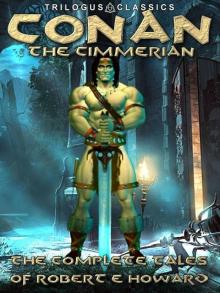 Conan the Cimmerian: The Complete Tales (Trilogus Classics)
Conan the Cimmerian: The Complete Tales (Trilogus Classics)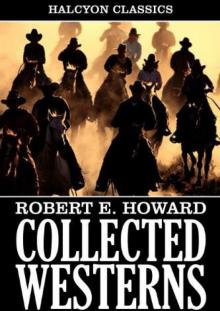 Collected Western Stories of Robert E. Howard (Unexpurgated Edition) (Halcyon Classics)
Collected Western Stories of Robert E. Howard (Unexpurgated Edition) (Halcyon Classics)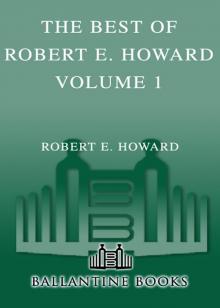 The Best of Robert E. Howard, Volume 1
The Best of Robert E. Howard, Volume 1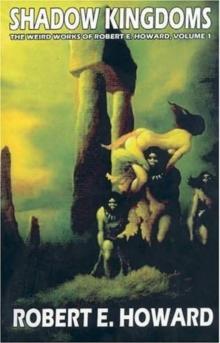 Shadow Kingdoms
Shadow Kingdoms